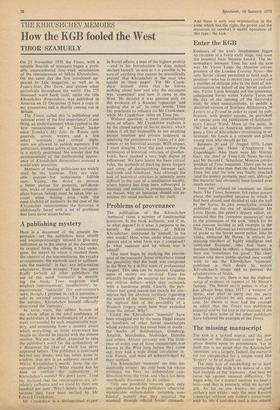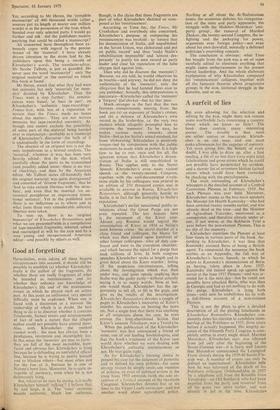The missing manuscript
The KGB is a tainted source, and the pro- venance of the document cannot but cast grave doubts upon its genuineness. Yet in itself this is no proof that the Khrushchev 'memoirs' are a forgery. Indeed, the matter is far too complicated for a simple word like 'forgery' to be of much use.
The only way of establishing, or at least approaching the truth is by means of a tex- tual analysis of the 'memoirs'. And here we come up against unusual difficulties. To begin with, for a textual analysis we need a text—and that is precisely what we haven't got. As far as one knows, no original author's text exists: only the neat Russian
typescript, without any author's corrections, 4.0 seen by Mr Crankshaw and a few others. Yet, according to Mr Heren, the 'complete manuscript' of 400 thousand words (other sources put its length at nearer one million words) is in the possession of the KGB, which handed over only selected parts. I would go further and ask : did the publishers receive anything that could be called a manuscript? All concerned have throughout been ex- tremely cagey with regard to the precise nature of the 'material'. I have already drawn attention to the stress laid by the publishers upon this being a record of Khrushchev's words. The translator-editor, Mr Strobe Talbott, is just as guarded. He never uses the word 'manuscript' : only 'the original material' or 'the material on which this book is based'.
Mr Heren, stated that what they had were not memoirs but only 'materials for mem- oirs' dictated by Khrushchev. Then the Times .went a step further: the reminis- cences were based, 'at least in part', on Khrushchev's 'authentic tape-recordings'. France-Soir, with less of a reputation to sustain than the Times, made no bones about the matter: 'They are not written memoirs but tape-recorded souvenirs'. Al- though one cannot exclude the possibility of some part of the material being handed over in manuscript—probably as a transcript of Khrushchev's discourse—the bulk of it is undoubtedly in the form of recordings. The absence of an original text is not the only impediment to a textual analysis. The 'material', whatever it was, has been very heavily edited : first by the KGB, which carefully chose the parts to be transmitted (and possibly added some—there is no way of checking), and then by the American editor. Mr Talbott states off-handedly thAt the original material. 'was quite disorganised' and consisted of 'diverse fragments', that he 'had to take certain liberties with the struc- ture', and even that he inserted 'an oc- casional paraphrase or improvised transi- tional sentence'. Yet in the published text there is no indication as to where and in what form these very considerable editorial liberties were taken.
To sum up, there is no 'original manuscript' of Khrushchev Remembers, and what we are presented•with is a compilation of tape-recorded fragments, selected, edited and rearranged at will by the KGB and by a very young and inexperienced American editor—and possibly by others as well.











































 Previous page
Previous page